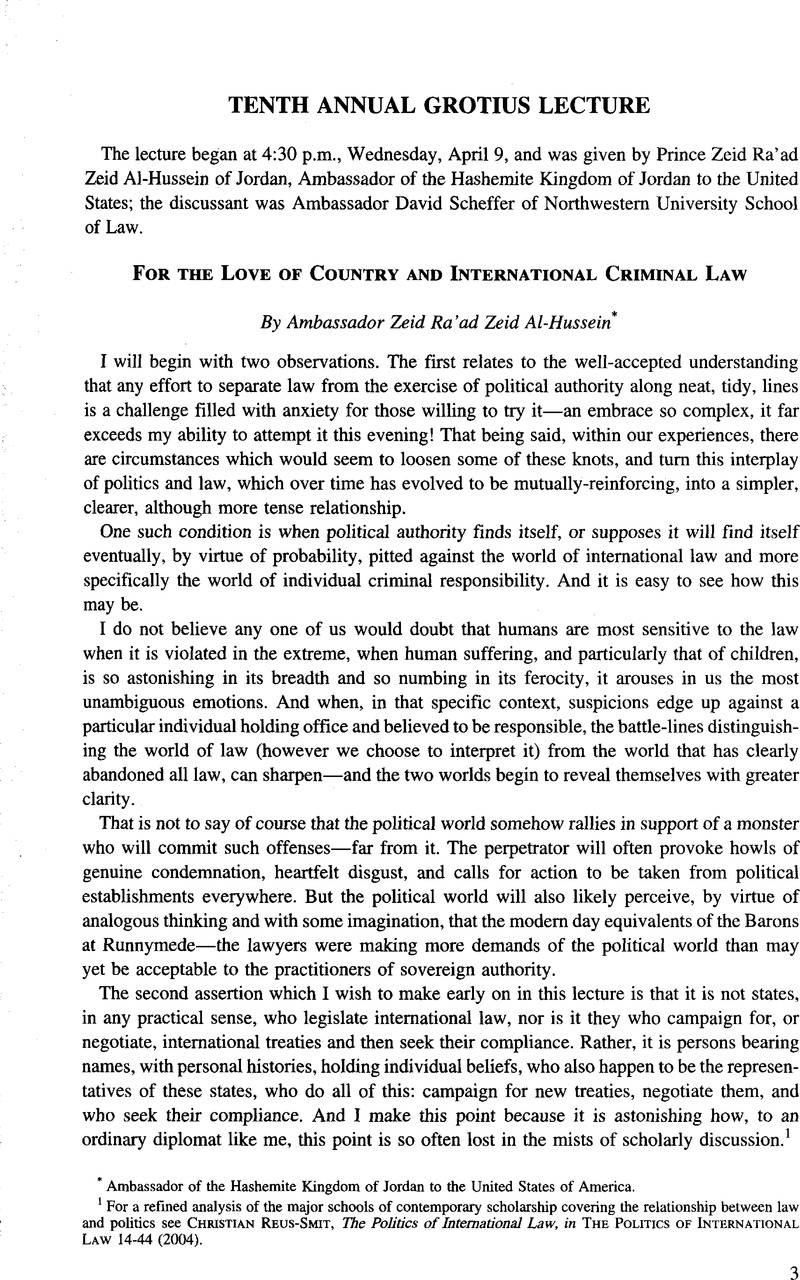No CrossRef data available.
Article contents
For the Love of Country and International Criminal Law
Published online by Cambridge University Press: 28 February 2017
Abstract

- Type
- Tenth Annual Grotius Lecture
- Information
- Copyright
- Copyright © American Society of International Law 2008
References
1 For a refined analysis of the major schools of contemporary scholarship covering the relationship between law and politics see Reus-Smit, Christian, The Politics of International Law, in The Politics of International Law 14-44 (2004)CrossRefGoogle Scholar.
2 In his brilliant book on Identity and Violence: the Illusion of Destiny, Amartya Sen demonstrates how our inclination to lay specific emphasis on only one or two of the many identities or affiliations we enjoy (and for the most part he is concerned with religious affiliations) can fall easy prey to those militants and chauvinists who will exploit and catapult this popular tendency to an extreme wherein it begets violence. and he argues persuasively, the extent to which we must therefore broaden our appreciation of whom we are. See Amartya Sen, Identity and Violence: The Illusion of Destiny (2006).
3 Taken from the famous play that he authored: Judgment at Nuremberg, and based on the “Judges’ Trial” of 1947—the third of the twelve subsequent trials held in Nuremberg.
4 Lord Moran, The Anatomy of Courage 67 (2007).
5 Richard Marius, Thomas More: A Biography 458-461 (1999).
6 Id. at 482.
7 Gerard B. Wegemer, Thomas More: A Portrait of Courage 217 (2007).
8 Christopher R. Browning, Ordinary Men: Reserve Police Battalion 101 and the Final Solution in Poland 73, 162, 184, 191-223 (1992). In Christopher Browning’s extraordinary book, the actions of ordinary Germans committing the most unspeakable crimes is analyzed in great detail and from a variety of angles. What emerges from his analysis, is his conclusion that most of the ordinary men of this Battalion, believing “their people” to be in a race war against an objectified enemy threatening Germany, and conditioned to accept, at a very fundamental level, “their Germanic Racial Superiority”, committed mass murder willingly with few reservations.
9 For an eloquent and moving description, offered in 1969 by a surviving sister of the leaders of the movement, concerning the method of resistance chosen see Inge Scholl, The White Rose: Munich 1942-1943 94-103 (1983).
10 Annette Dumbach & Jud Newborn, Sophie Scholl and the White Rose 199 (2006). See text of the second leaflet.
11 The recommendation stemmed from an earlier suggestion that UN personnel be DNA tested if a question of paternity arose in the course of an investigation or there was general suspicion of there having been a criminal offense. The Secretary-General, Letter from the Secretary-General to the President of the General Assembly, ζζ 31, 72, U.N. Doc. A/59/710 (Mar. 24, 2005).
12 Rome Statute of the International Criminal Court art. 27, U.N. Doc. A/Conf.183/9 (Jul. 17, 1998).
13 ld. art. 5.
14 In some of the earlier pieces of scholarship on the International Criminal Court long essays were devoted to exposing the perceptions and desires of the delegates who negotiated the statute with commendable, but not always with complete, accuracy. Unfortunately, many of these scholars in their early writings also omitted the centrality of victims in shaping our perceptions as delegates to the Rome Conference and in the overriding need to extinguish impunity from the world for the most barbaric of crimes. See Wippman, David, The International Criminal Court, in The Politics of International Law 151-168 (Reus-Smit, ed., 2004)CrossRefGoogle Scholar.
15 United States of America v. Otto Ohlendorf et al., IV Nürnberg Military Tribunal 412 (1948).
16 Id.




